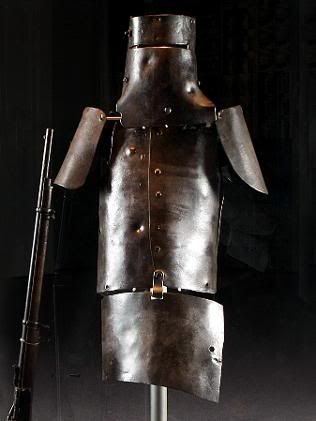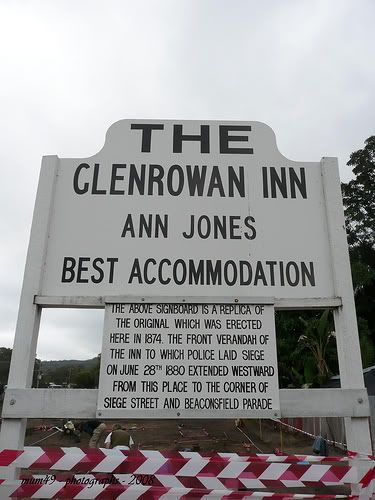A few months ago, an Ethiopian co-worker asked me, 'What's the thing with Ned Kelly? Wasn't he just a criminal?' I said 'I think it's the armour, have you seen the armour? And he had a Robin Hood thing going which helped.' But in the end, I had to agree, it is odd. For those not in the know, Ned Kelly was a bushranger, a Australian combination of highway man and cattle thief, whose gang eluded the police from 1878-1880 after they killed three police who were sent to capture or kill them.
 He is not the first to ask this question. Victorian Police for example hate the Kellys. Every year in their parade for officers killed in action, they have three riderless horses to represent the three policemen killed by the Kelly Gang. Without a doubt, Kelly was a career criminal and his final plan was to massacre a train full of policemen. If he were alive today, we wouldn't like him much at all.
He is not the first to ask this question. Victorian Police for example hate the Kellys. Every year in their parade for officers killed in action, they have three riderless horses to represent the three policemen killed by the Kelly Gang. Without a doubt, Kelly was a career criminal and his final plan was to massacre a train full of policemen. If he were alive today, we wouldn't like him much at all.
But he isn't around now and that may be part of the point. Although his career as a criminal had started with some stock theft before Stringybark Creek, he had spent three years in prison for riding a horse that someone else had stolen. The actual thief got three months. His mother was put in jail with little provocation, having been arrested with her three day old arms in her arms. Kelly, and others in the district, had little reason to respect the law.
The relationship between the people and the police is different now than in 1878. Now we have a trained and professional force and if we think we detect them in corruption or other wrongdoing, there are mechanisms for reporting and dealing with such actions. In 1878 we had no such guarantees. Ian Shaw, in his book Glenrowan: The siege that changed a nation, says the Kelly Outbreak, as it was known, was caused in part by bad policing and bad policemen.
 The Kelly Outbreak has been the subject of countless history books and novels, plays, two films (one of which claims to be the world's first feature film) and a major Australian mini-series, made on the 100th anniversary of Ned's death. Without a doubt it is one of the major myths of post-colonial Australia. Shaw's book focusses on the final act, the siege of Glenrowan, that started with the murder of an informant, and ended with three outlaws dead, police wounded, civilians wounded and killed, and Ned on his way back to Melbourne for his trial. (He was taken off the train at North Melbourne Station, where I work. That's not important, but I like to know it.)
The Kelly Outbreak has been the subject of countless history books and novels, plays, two films (one of which claims to be the world's first feature film) and a major Australian mini-series, made on the 100th anniversary of Ned's death. Without a doubt it is one of the major myths of post-colonial Australia. Shaw's book focusses on the final act, the siege of Glenrowan, that started with the murder of an informant, and ended with three outlaws dead, police wounded, civilians wounded and killed, and Ned on his way back to Melbourne for his trial. (He was taken off the train at North Melbourne Station, where I work. That's not important, but I like to know it.)
The great strength of this book is the detail it can give to the siege. You can follow the police commissioner from his table at a Melbourne Club along the train ride from Spencer Street (now Southern Cross Station) to Glenrowan. While most accounts focus naturally on the outlaws and the leaders of the police, Shaw is able to investigate more of the characters around them. And here he finds heroism, stoicism and appalling behaviour. We (famously) have the wounded Ned coming back to try to rescue his friends, and we have a police officer firing deliberately on civilians. We have terrified civilians (and their names, and their relationships) and bravery from all over.
 The siege at Glenrowan was designed to be mythic. Kelly saw it as the final act of defiance, an end to police presence in northeast Victoria, and the gang fought in armour, like knights lost in time. Whether he was planning to establish the Republic of North East Victoria, as Ian Jones believes, we'll never know. But as an end to the Outbreak, and the end of the bushranging era, no writer could have come up with anything better. The reporters who had made it to the little town knew they were witnessing the biggest story of their lives.
The siege at Glenrowan was designed to be mythic. Kelly saw it as the final act of defiance, an end to police presence in northeast Victoria, and the gang fought in armour, like knights lost in time. Whether he was planning to establish the Republic of North East Victoria, as Ian Jones believes, we'll never know. But as an end to the Outbreak, and the end of the bushranging era, no writer could have come up with anything better. The reporters who had made it to the little town knew they were witnessing the biggest story of their lives.
Perhaps that is part of the reason Kelly lives in our memories, because he set out to. In his statements to police, speeches he gave during his robberies, the Jerilderie letter, and at his trial, he gave himself a role as a man wronged, a family victimised, and painted himself part Robin Hood, part Masked Avenger. And it was not a portrait without some truth. When Ned Kelly walked out of the mist on the last morning of the Kelly Outbreak, clad in armour, blood streaming from his wounds, calling a challenge to the police, did he know he was entering the history books? My bet is he did.
No comments:
Post a Comment